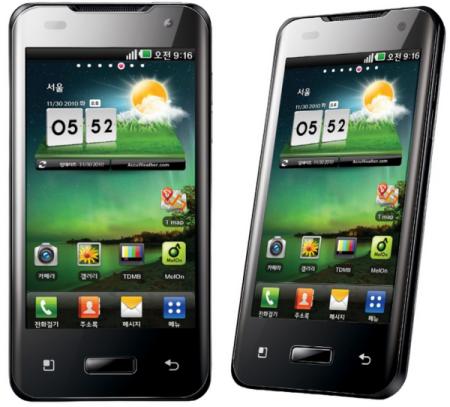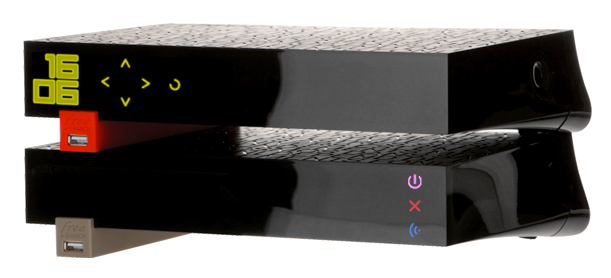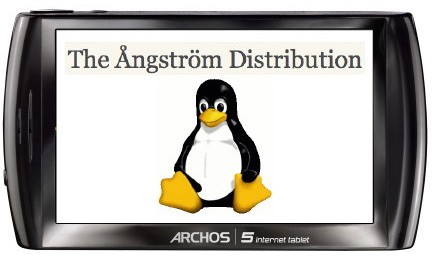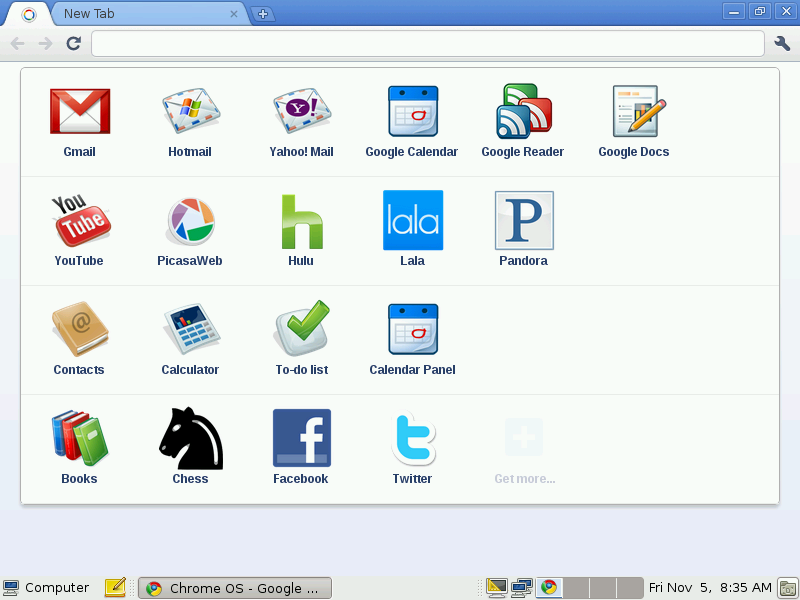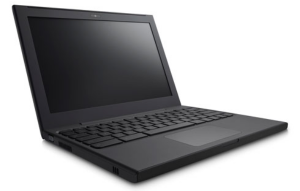LG has just introduced the Optimus 2X (codenamed the LG Star), the first smartphone to run a dual-core processor namely Nvidia Tegra 2 @ 1GHz. The device will be initially available in Korea (Model: LG-SU660) in January 2011, and later in the year in Europe, then the rest of Asia (Model: LG-P990). LG Optimus 2X will be shipped with Android 2.2 upgradeable to Android 2.3 (Gingerbread). The phone features a 4-inch WVGA screen, 8GB of internal memory, microSD support (up to 32GB), HDMI output, Digital Multimedia Broadcasting (DMB), DLNA support, an accelerometer, a gyro sensor, 1080p MPEG-4/H.264 playback and recording and finally 2 cameras: an 8 megapixel back camera plus a 1.3 megapixel front camera for video calls. Please see the video below where the Optimus 2X is compared to the iPhone 4 and the Samsung Galaxy S. The LG Star is really the clear winner in terms of performance. […]
Freebox Revolution Set-Top Box: Internet, TV, VoIP, Mobile and Gaming
Free (Iliad) has just announced the Freedom v6 Révolution on the 14th of December 2010. This solution that offers 28 Mbps internet access, digital television (IPTV/DVB), telephony (DECT, VoIP, Mobile…), Network Access Storage (NAS) and Gaming is actually based on two boxes designed by Philippe Starck: Freebox server: Handles networking (ADSL 2+ /wifi), NAS, telephony… Freebox player: Handles multimedia functions with the blu-ray player, digital television support… Free also released the technical specifications for both devices: Technical Specification of Freebox Server ADSL / ADSL2+ ANSI T1 413 / ITU G.992.1, G.992.3, G.992.5 Annex A 4 Ethernet ports 10 / 100 / 1000 Base-T SFP Port 2 USB 2.0 Ports e-SATA Port Stereo audio input/output with integrated speakers FXS Port (Telephony) WiFi 802.11b/g/n 3×3 450 Mbps 2.4 Ghz Base Station DECT CAT I/Q Internal 250 GB Hard Disk ARM9 Processor @ 1.2GHz with 512 MB RAM Noise < 37dB (while HDD […]
Building Archos Gen8 Source on Ubuntu 10.10
[ad#Google Adsense-Leaderboard] In a follow-up post of GPL Source code and SDE for Archos Gen8 Devices earlier today, here are the steps I followed to build the toolchain, kernel and root file system with buildroot on Ubuntu 10.10 Desktop version: Extract the source code: tar xzvf ../Downloads/gen8-gpl-froyo.tgz Install extra packages for the build: sudo apt-get install flex bison build-essential zip curl libmpfr-dev libmpfr1ldbl automake autoconf libtool gettext texinfo Run the build to generate the toolchain, kernel and root file system: cd gen8-gpl-froyo/buildroot sudo make Then wait for a while (It took 1h15 on my machine) to get the binary images: zImage (kernel) in buildroot/linux/arch/arm/boot rootfs.arm.squashfs (rootFS) in buildroot/binaries/uclibc
GPL Source code and SDE for Archos Gen8 Devices
Right at the end of November, Archos released the first version of their Android 2.2 firmware (2.0.54). They now have also released the GPL code for this firmware. http://www.archos.com/support/download/software/sources/gen8-gpl-froyo.tgz In this package, you’ll find the following: Linux Kernel 2.6.29 buildroot – Set of tools to generate the cross-compilation toolchain, the kernel and the root file system A directory called “external” with the following libraries, tools and drivers: alsa-lib – Audio library blktrace – Driver debugging tool elfcopy – Tool to generate executable binaries grub – Bootloader iptables – Firewall Tool liblzo – LZO Compression Library webkit – Web Browser Engine alsa-utils – Audio Tools BlueZ – Bluetooth Protocol Stack elfutils – Tool to manipulate executable binaries hostapd – For Wifi Authentication jdiff – Java Code Analyzer openvpn – VPN Client/Server wpa_supplicant – Wifi tools for WPA/WPA2 bison – Parser Generator dbus – Libray and daemon for IPC (InterProcess Communication) genext2fs […]
Unusual USB Devices in Linux Kernel
Some USB devices (especially cheap ones) are not fully compatible with the USB Stack and when you connect such devices to your target board, the kernel may output errors similar to the one below even though most other devices work perfectly. sd 3:0:0:0: SCSI error: return code = 0x10070000 end_request: I/O error, dev sda, sector 0 Buffer I/O error on device sda, logical block 0 sd 3:0:0:0: SCSI error: return code = 0x10070000 end_request: I/O error, dev sda, sector 8 Buffer I/O error on device sda, logical block 1 sd 3:0:0:0: SCSI error: return code = 0x10070000 end_request: I/O error, dev sda, sector 16 sd 3:0:0:0: SCSI error: return code = 0x10070000 end_request: I/O error, dev sda, sector 24 sd 3:0:0:0: SCSI error: return code = 0x10070000 It previously happened to us with a IDE to USB adapter based on Super Top Bridge ( VID: 0x14CD / PID: 0x6600). The […]
Software Code Review Study and Best Practices
Many companies perform software development without code reviews – the systematic examination of source code intended to find and fix mistakes overlooked by the original developer – or at least without formal reviews. I’ve recently come across The Value and Importance of Code Review white paper from Klocwork who commissioned an independent company to survey IT professional. This paper shows code review practices have not changed much over the years even though software development have dramatically evolved. Here are the key findings of the study: Code reviews are valuable, but approaches tend not to be formal. Modern development is increasingly complex, and code reviews are not keeping pace. (i.e. Code reviews are low priority tasks) Code reviews don’t always include the right people. (e.g. Architecture and QA Team are left out, only only software engineer are part of the review) Tools don’t play a significant role in reviews. (e.g. code […]
Installing Chrome OS with CD or USB
Chrome OS is a lightweight Linux distribution build around the Google Chrome Browser, it is not related to Google Chrome OS. I suppose they may have to change the name sometimes in the future. To install it, simply download Chrome OS Live CD to try it out on your hardware. Bear in mind this is a Release Candidate version (Chrome OS 0.9.576 RC released on 7th of December 2010) at this time so it should be relatively stable, but expect a few bugs. Here are the main software packages installed in Chrome OS: GNOME 2.30 desktop environment Google Chrome 9.0.576 web browser Google Picasa 2.7 photo manager OpenOffice.org 3.2 office suite GIMP 2.6 image editor Flash Player 10.1 plugin Wine Windows emulator 1.2 Pidgin 2.6 instant messenger Dashboard in browser (See screenshot below) Here are the system requirements of Chrome OS: Processor: Intel Pentium, Xeon or newer; AMD Duron, Athlon, […]
Google Chrome Notebook Cr-48 and Chrome OS Update
After unveiling Google Nexus S and Android 2.3, Google lifted the lid on its reference notebook codenamed “Cr-48″ and provided updates about Chrome OS. This notebook features a 12.1” monitor and runs Chrome OS on an Intel platform. The Cr-48 Chrome Notebook is only designed for Chrome OS pilot program and will be distributed free of charge to selected organization and users in the United States. Here’s an excerpt from Google Chrome OS website: Each participant in the Pilot program will receive a Cr-48 Chrome notebook; in return, we’ll expect you to use it regularly and send us detailed feedback. Sound interesting? Please note: Chrome OS is for people who live on the web. It runs web-based applications, not legacy PC software. The Pilot program is not for the faint of heart. Things might not always work just right. The Pilot program is open to individuals, businesses, schools, non-profits and developers based […]


